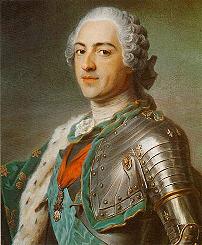Louis XV the Beloved one
 |
 |
 |
Louis XV Bien-Aimé (Versailles, 1710 id., 1774), king de France, great-grandson of Louis XIV, whom it succeeded in 1715. The Regency, chaired by Philippe of Orleans (1715-1723), succeeded the government of the duke of Bourbon (1723-1726), who made him marry Marie Leczinska (1725), then that of the Fleury cardinal (1726-1743), who engaged France in the war of succession of Poland (1733-1738), that finished the treaty of Vienna. With died of his old tutor (1743), the king announced his intention to control personally, but, in fact, it let act its ministers. Two large wars, the war of succession of Austria (1740-1748) and the Seven Year old war (1756-1763), sacrificed the colonial interests of France (loss of the possessions of India and Canada, loss of Western Louisiana), without supporting its European interests. However, France acquired two new provinces: Lorraine (1766) and Corsica (1768). Inside, the kingdom suffered from a crisis of the monarchical capacity, Louis XV demonstrator an incapacity to control; the excessive expenditure of the king alienated the Parliament of Paris to him, that Maupeou removed in 1771; its connections (Mrs. de Pompadour, Mrs. of Barry) were reproached to him. However, managed well at the end of the reign by Choiseul, then by Maupeou, France profited from a great economic advancement.
